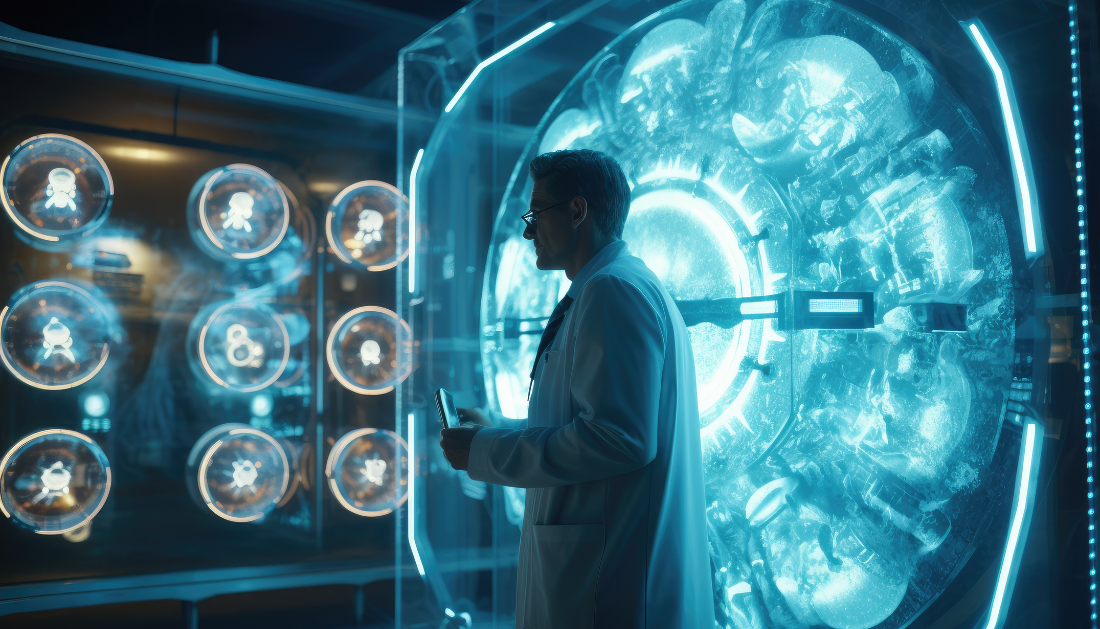

The Department of Energy has granted a sizable funding to Keck Graduate Institute (KGI), a component of The Claremont Colleges, to study the effects of low-dose radiation on people. The study will improve society’s knowledge of the short- and long-term consequences of radiation exposure, whether through occupational exposure or through standard cancer therapies. The grant, named “AI-facilitated assessment of exosome-mediated bystander effects of low-dose ionizing radiation,” will start in September and run for three years, totaling $750,000. The same amount was given to Los Alamos National Laboratory, which will collaborate with KGI on the project.
Professor of systems biology and genomics Animesh Ray, the project’s principal investigator, has been at KGI since 2001. His team uses artificial intelligence to investigate the effects of low-dose radiation on humans. The ultimate objective is that this work may contribute to the development of a policy standard for the acceptable upper limit of low-level radiation exposure.
“Many people are exposed to radiation in their work. This runs the gamut from people who work with nuclear reactors to pilots to those who work with X-rays and, of course, disasters such as Three Mile Island and Chornobyl. Strangely, we have seen that low radiation doses can have a stronger negative effect on health than predicted from models based on higher radiation doses. This is a mystery we are delving into.”- Animesh Ray, Professor, Systems Biology and Genomic, Keck Graduate Institute
Ray and his group, for instance, are curious on how low-dose radiation affects cancer treatment.
“Research shows that if you expose a single cell to radiation, its effect travels outside the cell. The irradiated cells can influence normal cells not exposed to radiation, and sometimes these unirradiated cells even respond as if the cell was directly hit by the radiation,” Ray says. “The DNA gets modified and damaged from this. Although sometimes it can be repaired properly, other times it can die or mutate to potentially cause cancer. Then, while trying to remove the cancer with radiation, it could make new cancer. We call this the bystander effect, where unirradiated cells getting information from irradiated cells may produce these negative effects. This is what we want to study.”
KGI’s project partner, Los Alamos National Laboratory, under the direction of Dr. Kumkum Ganguly, leads a team of scientists that will generate the irradiation cells that will be used in single-cell RNA sequence analysis study by KGI’s research team.
The KGI team, which consists of postdoctoral researchers and current students, will use cutting-edge artificial intelligence methods to examine the data.
“The grant is not for solving a problem but for understanding a problem,” Animesh says. “The standard for the amount of radiation people can be exposed to came from studies done decades ago, but the work to figure out how low dose radiation produces biological effects has been difficult and long overdue since the human genome revolution began.”
Source Link: Keck Graduate Institute
more recommended stories
 Red Blood Cells Improve Glucose Tolerance Under Hypoxia
Red Blood Cells Improve Glucose Tolerance Under HypoxiaKey Takeaways for Clinicians Chronic hypoxia.
 Nanoplastics in Brain Tissue and Neurological Risk
Nanoplastics in Brain Tissue and Neurological RiskKey Takeaways for HCPs Nanoplastics are.
 AI Predicts Chronic GVHD Risk After Stem Cell Transplant
AI Predicts Chronic GVHD Risk After Stem Cell TransplantKey Takeaways A new AI-driven tool,.
 Red Meat Consumption Linked to Higher Diabetes Odds
Red Meat Consumption Linked to Higher Diabetes OddsKey Takeaways Higher intake of total,.
 Pediatric Crohn’s Disease Microbial Signature Identified
Pediatric Crohn’s Disease Microbial Signature IdentifiedKey Points at a Glance NYU.
 Nanovaccine Design Boosts Immune Attack on HPV Tumors
Nanovaccine Design Boosts Immune Attack on HPV TumorsKey Highlights Reconfiguring peptide orientation significantly.
 High-Fat Diets Cause Damage to Metabolic Health
High-Fat Diets Cause Damage to Metabolic HealthKey Points Takeaways High-fat and ketogenic.
 Acute Ischemic Stroke: New Evidence for Neuroprotection
Acute Ischemic Stroke: New Evidence for NeuroprotectionKey Highlights A Phase III clinical.
 Statins Rarely Cause Side Effects, Large Trials Show
Statins Rarely Cause Side Effects, Large Trials ShowKey Points at a Glance Large.
 Anxiety Reduction and Emotional Support on Social Media
Anxiety Reduction and Emotional Support on Social MediaKey Summary Anxiety commonly begins in.

Leave a Comment